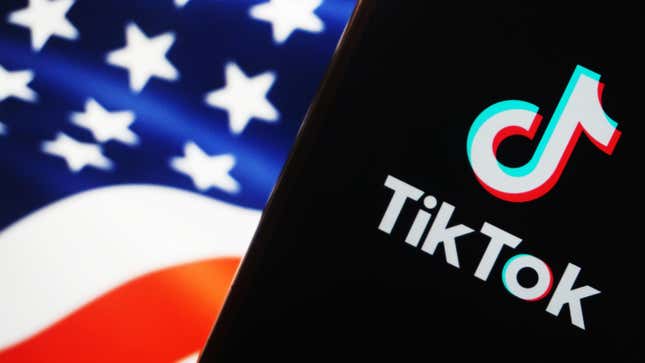How Seriously Should We Take Congress’ Proposed TikTok Ban?
A key House committee just passed a bill that would give Biden the authority to ban TikTok, likening the app to a Chinese "spy balloon in your phone."
Politics

On Wednesday, the U.S. House Foreign Affairs Committee voted along party lines to advance a bill that would pressure President Biden to impose a national ban on TikTok. The bill—H.R. 1153, or the Deterring America’s Technological Adversaries Act—was only introduced by House Republicans on Friday, but it was fast-tracked out of supposed urgency, as Republican lawmakers claim the social platform empowers the Chinese government to surveil, gather intelligence, and meddle in U.S. policymaking. This is because TikTok is owned by a private company called ByteDance, which is based in China.
The home-country of TikTok’s parent company has been the subject of controversy for years now, and state governments including Texas have considered state-wide bans on the app in recent months. Back in December, Congress banned TikTok from government devices, and the app has been restricted from state computer networks (including at public universities) in some states as of January. To be clear, the bill has a long way to go, as it awaits a House floor vote and another in the Senate, which doesn’t seem especially likely to send the bill to Biden’s desk. From there, it would be up to the president whether to sign H.R. 1153, and then, whether to ban TikTok—an app that Biden, himself, has used, quite memorably, with the aid of the Jonas Brothers.
That said, concerns about TikTok aren’t just partisan; the FBI and Federal Communications Commission have both warned that ByteDance could share TikTok users’ data with the Chinese government. Many steps and barriers remain for the bill to reach Biden’s desk, if it makes it at all—but the fact that the House Foreign Affairs Committee expedited the legislation suggests Republicans intend to move the bill forward as quickly as possible. Still, as the bill advances, TikTok remains very much not banned, meaning all the two-minute niche drama explainers and fan-theorizing about Kylie Jenner and Selena Gomez’s eyebrow-gate are safe… for now.
-

-

-

-

-

-

-

-

-

-

-

-

-

-

-

-

-

-

-

-

-

-

-

-

-

-

-

-

-

-

-

-

-

-

-

-

-

-

-

-









































